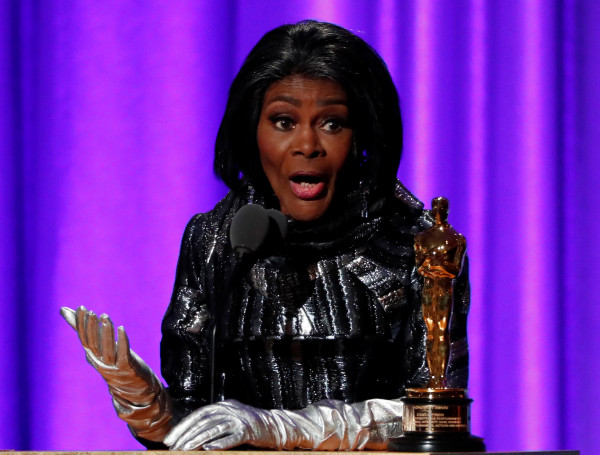Actress Cicely Tyson, groundbreaking Emmy and Tony winner, dies at age 96

(Reuters) - Actress Cicely Tyson, who specialized in portraying strong Black women caught up in life's struggles during a 60-year career that earned her three Emmys and a Tony Award, died on Thursday at age 96, her manager said in a statement.
No cause of death was given. Tyson had recently completed a memoir, "Just As I Am," which was released just this week.
Tyson's most-lauded performances came in historical works such as the 1972 movie "Sounder" in which she played a Louisiana sharecropper's wife. That film earned Tyson her only Academy Award nomination, but she received an honorary Oscar in November 2018.
She also won two Emmys for the same TV movie, "The Autobiography of Miss Jane Pittman" - one for best actress in a miniseries or movie and one for actress of the year. The 1974 movie covered a woman's life from slavery to the 1960s.
Tyson picked up another Emmy 20 years later for "Oldest Living Confederate Widow Tells All." Her nine other Emmy nominations included playing Binta, the mother of the slave Kunta Kinte in the groundbreaking 1977 miniseries "Roots," the Rev. Martin Luther King Jr.'s wife, Coretta, in "King," and the inspirational educator in "The Marva Collins Story."
Her manager, Larry Thompson, said in a statement that Tyson
"thought of her new memoir as a Christmas tree decorated with all the ornaments of her personal and professional life."
"Today she placed the last ornament, a Star, on top of the tree," he added.
Tyson's career boomed even in her 80s. In 2011, she was part of the ensemble of the much-praised film "The Help" and in 2013, at age 88, she won a Tony for a Broadway revival of "The Trip to Bountiful," the story of a woman returning to her small hometown. It was her first time on Broadway in 30 years.
Even after turning 90, Tyson was busy. In 2015, she starred with frequent collaborator James Earl Jones in a Broadway revival of the two-person play "The Gin Game." The New York Times said Tyson and Jones, who had last appeared on Broadway almost 50 years earlier, proved "that great talent is ageless and ever-rewarding."
In February 2019 at age 94, Tyson was on the cover of Time magazine's "The Art of Optimism" edition and an interviewer asked if she had considered retiring. "And do what?" was her response.
'STILL WE HOLD ON'
Tyson said she used her career to take on issues important to her, such as race and gender.
"I realized very early on when I was asked certain questions or treated in a certain way that I needed to use my career to address those issues," she said in a People magazine interview in 2015.
Tyson told CBS she saw the Hollywood hierarchy as a ladder with white men at the top, followed by white women and Black men. Black women were at the bottom.
"And we're holding on to the last rung," she said. "And those fists are being trampled on by all those three above and still we hold on."
Actress Viola Davis said she was "devastated" by news of the death of Tyson, who played the mother of Davis' character on the TV legal drama "How to Get Away with Murder" from 2015 to 2020.
"You were everything to me!" Davis wrote on Instagram. "You made me feel loved and seen and valued in a world where there is still a cloak of invisibility for us dark chocolate girls."
LeVar Burton, who portrayed Kunta Kinte in "Roots," praised his "first screen Mom."
"Elegance, warmth, beauty, wisdom, style and abundant grace," Burton wrote on Twitter. "She was as regal as they come."
Tyson was born in December 1924 in New York and grew up in the city's Harlem neighborhood, the daughter of immigrants from the West Indies. She was a secretary and model before taking acting jobs in the 1950s. In the early 1960s, she became one of the first Black actors to appear regularly on U.S. television, playing George C. Scott's secretary on the series "East Side, West Side."
One of her early stage roles was in "The Blacks," an off-Broadway production about race that helped boost the careers of Jones, Maya Angelou, Louis Gossett Jr., Godfrey Cambridge and Roscoe Lee Brown.
Tyson took parts as prostitutes in two other plays in the 1960s before deciding to make a stand.
"After that, I was offered the part of another whore and I said no because I didn't want to get typecast and because it was demeaning to Black women," she told the New York Times.
Tyson was given the Presidential Medal of Freedom by Barack Obama in 2016. When she was presented with a Kennedy Center Honor in December 2005, filmmaker-writer Tyler Perry said: "She chose to empower us when we didn't even know it was possible to be empowered. Cicely refused to take a role that would not better humanity."
Tyson was married to jazz trumpet legend Miles Davis from 1981 to 1988 and Davis, who died in 1991, put her on the cover of his album "Sorcerer."
Their marriage was rocky, troubled by reports of his alleged philandering, domestic violence and substance abuse. But in a 2015 interview with CBS, Tyson said: "I don't really talk about it but I will say this: I cherish every single moment that I had with him."
(Reporting by Lisa Richwine in Los Angeles and Bill Trott; Editing by Chris Reese and Peter Cooney)












